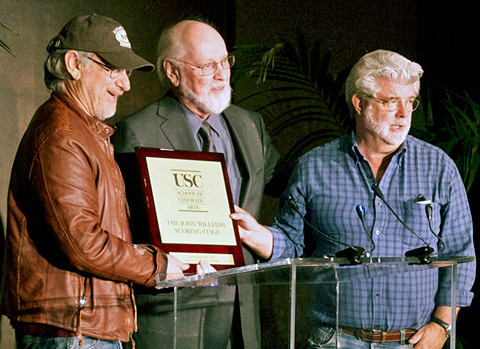

  |
|
|
||||||||||||||||||||||
|
FMS FEATURE... April 28, 2011 John Williams Scoring Stage Unveiled Spielberg, Lucas honor longtime collaborator in tribute at USC Cinema School by Jon Burlingame  (Left to right) Steven Spielberg, John Williams and George Lucas unveil The 1,900-square-foot room, formerly known as the Steven Spielberg stage, was built in 1983 and is regularly used to record music for student films made by USC directors. The renaming, a USC spokesman said, was "a tribute to Steven and George's long collaborations with (Williams) and a recognition of how important an inspiring name like John's is to the next generation here at the school." Williams, 79, called it "an indescribable honor and privilege" and spoke of the scoring stage as a place that "brings together the sister arts of film and music.... This stage represents an intersection between the future and the present." Approximately 70 invited guests listened as Spielberg and Lucas recalled how they met the celebrated composer, four of whose five Oscars (and 17 of whose 45 nominations) are for films directed by one or the other: Jaws, Star Wars, E.T. the Extra-Terrestrial, and Schindler's List. Spielberg called meeting Williams "the greatest luck I've ever had in the industry" and admitted that while he was writing The Sugarland Express he had been listening to Williams' bluegrass-infused score for The Reivers and thinking about hiring that composer. He did, and their next film was the now-legendary Jaws. Spielberg said he had been a fan of the classic Hollywood scores composed by European expatriates, and praised Williams for maintaining that tradition – "non-electronic, using real people, brilliant musicians, to bring film music back to where it used to be." Symphonic scores, he said, "seem to be in short supply these days." Using Williams' jazz-inflected score for Catch Me If You Can as an example, he said the composer "bends to the mood of the film he's looking at. John rewrites the movie. He does a page-one musical rewrite. He brings the story musically to an audience." Lucas confessed that, back in the mid-1970s, he asked Spielberg for advice on a composer who might be able to write "an old-fashioned symphony orchestra score" for his space opera, and when Spielberg suggested Williams, Lucas responded, "Isn't he a jazz guy?" Spielberg responded, "Trust me," and the rest became cinema history. Lucas, describing the composer's quiet, reserved manner, called him "a casual genius." The Star Wars auteur and USC alumnus elicited laughter from the crowd when he said "all we did was put pictures to his music," and that "Star Wars without John is just another episode of Battlestar Galactica." Williams thanked both Spielberg and Lucas – who earlier this year proposed that the stage should be renamed in his honor – as "my friends, visionaries, artists, entrepreneurs, significant philanthropists and great citizens. My luckiest day was meeting you both." The composer said that Spielberg's nickname for him was "Max" (as in Steiner), but that his nickname for the director was "Angel – creatures who fly effortlessly above the rest of us." He said that, in nearly 40 years of working together, he had never heard Spielberg, upon listening to a theme or musical idea, say "I don't like that. He always leaves with a sense of excitement," Williams said. The composer got the afternoon's biggest laugh when told the Schindler's List story he has often told in concert settings: How, after seeing a rough cut of the moving Holocaust film, he turned to Spielberg and said, "You need a better composer than I am for this film," and the director responded, "I know, but they're all dead." Director John Singleton recalled working with Williams, a longtime hero, on Rosewood, and worrying aloud whether Williams could find "the soul of the African-American experience" for his score. When Williams responded that he had arranged and conducted for Mahalia Jackson back in the early 1960s, Singleton decided he was "infinitely qualified" for the job. School of Cinematic Arts Dean Elizabeth Daley called Williams "one of the most important artists that there has ever been in the world of entertainment" and said that the name on the scoring stage would remind those who worked there of "the quality to which they must aspire." Also attending were several longtime Williams colleagues including producers Kathleen Kennedy and Frank Marshall, scoring mixers Shawn Murphy and Bruce Botnick, and music editor Kenneth Hall; and other members of the film-music community including Fong (Mrs. Maurice) Jarre and Elmer Bernstein's daughters Emilie and Elizabeth. USC Scoring for Motion Pictures program director Brian King was also on hand, along with several members of this year's class. Sound department manager Richard Hyland reported that the facility will be upgraded this summer with the addition of a new 32-fader Avid mixing console to replace the old Euphonics board currently in use. ©2011 Jon Burlingame |
Search
Past Features
|